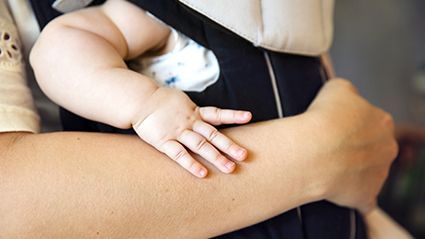TUESDAY, March 6, 2021 (HealthDay News) — The sooner a pregnant woman gets a COVID-19 vaccine, the more likely she is to transfer protective antibodies to her baby, a new, small study suggests.
“This just gives extra fuel for people who are on the fence or just think, ‘Maybe I’ll wait until after I deliver,'” said study co-author Dr. Emily Miller. She’s an assistant professor of obstetrics and gynecology and a maternal fetal medicine physician at Northwestern University School of Medicine.
“We strongly recommend you get the vaccine while pregnant. But if you’re fearing vaccination might harm the baby, these data tell us quite the opposite. The vaccine is a mechanism to protect your baby, and the sooner you get it, the better,” Miller said in a university news release.
The researchers analyzed the blood of 27 pregnant women who had received either the Pfizer or Moderna vaccine in their third trimester. They also analyzed the umbilical cord blood of their 28 newborns (26 singletons, one set of twins).
The women had a strong immune response after vaccination, suggesting that the vaccines protect pregnant women from COVID-19, according to the study.
It also found that a longer time between vaccination and delivery was associated with greater transfer of COVID-19 antibodies to the baby.
Only three of the infants (including the twins) in the study did not have antibodies at birth. Their two mothers received their first COVID shot less than three weeks before giving birth.
The study also found that mothers who received a second dose of the two-dose vaccines before delivery were more likely to transfer COVID-19 antibodies to their baby.
In a previously published study from another institution, researchers analyzed 10 umbilical cord samples and had similar findings.
There are a number of issues that require further study, however.
Because COVID-19 vaccines only became available late last year, it’s not known if vaccinating women even earlier in their pregnancies would result in greater transfer of antibodies to their babies, but Miller believes it will.
She also said it’s too early to tell how well or how long the antibodies transferred from mothers to babies will protect babies after delivery.
It’s also unclear how pregnancy complications could affect the transfer of antibodies from vaccinated mothers to their babies.
The findings were published April 1 in the American Journal of Obstetrics and Gynecology.
More information
The U.S. Centers for Disease Control and Prevention has more on COVID-19 for pregnant and breastfeeding women.
SOURCE: Northwestern Medicine, news release, April 1, 2021
Copyright © 2026 HealthDay. All rights reserved.

